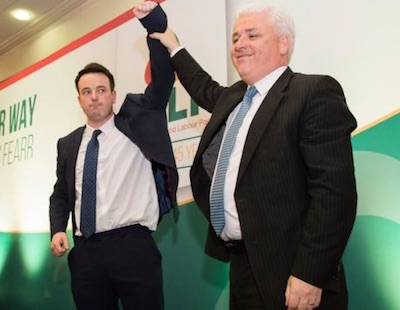
The unionist DUP and the nationalist SDLP are undergoing internal upheaval as the leadership of both parties is in the process of changing hands.
Last weekend, the SDLP, after a highly divisive leadership battle, picked its youngest ever leader in 32-year-old Colum Eastwood (pictured, left). The Derry-based politician ousted Alasdair McDonnell, more than three decades his senior, by 172 votes to 133.
In his inaugural speech as leader, Mr Eastwood paid tribute to his predecessor, saying the South Belfast MP had “stretched every fibre of his being” for the SDLP.
But there was little sign at the party conference of any change in political strategy. Instead, Eastwood affirmed the SDLP’s position as being the most moderate nationalist party, despite it losing more than half of its support to Sinn Fein in recent years.
He claimed Irish nationalism now had a “selfish and strategic interest” in making the Six-County state work, and it shared more in common with unionism than ever before.
“Our mantra and mission of making Northern Ireland work is that common ground,” he said. We need willing partners in unionism to make it happen and I firmly believe that those relationships can be formed.”
He blamed the DUP and Sinn Fein for the poor turnout in recent elections and said they were “stuck in a peace process mentality” and constant negotiation.
“The few policies which Stormont’s leadership have introduced have either been half-baked or half-implemented,” he said.
DUP TWIST
This weekend sees the annual conference of the DUP, which will be dealing with the consequences of the announcement by party leader Peter Robinson that his is to step down within weeks.
The DUP has had only two leaders since its formation in the early 1970s and has never held a leadership election.
North Belfast MP Nigel Dodds is odds-on favourite to succeed Peter Robinson as leader of the DUP -- but with the twist that the party’s finance minister Arlene Foster will take on the role of the North’s First Minister.
Mr Dodds is seen as being on the extremist wing of the party and the decision to split the leader’s role and that of the first minister is seen as a way of uniting members. He has been an upholder of a fundamentalist stance on the union and social issues, recently supporting evangelical preacher Pastor James McConnell after he was accused of racist and anti-Islamic slurs. He has also argued strongly against the introduction of same sex marriage.
Ms Foster is seen as less hardline, although she grabbed attention earlier this year with a sectarian outburst in which she described nationalist politicians are “rogues” and “renegades”.
Mr Robinson made his announcement days after the Stormont House deal was agreed, and is reportedly likely to be elevated to a seat in the ‘House of Lords’ in the New Year.
Sinn Fein’s Gerry Adams said the party will continue to work with the DUP regardless of who is leader. He described Mr Robinson as a respectful leader and said they had a “business-like, cordial relationship”. Colleague Martin McGuinness also paid tribute.
“Despite our political differences, I recognise fully the enormous personal contribution Peter has made, building on the work of his predecessor, Dr Paisley,” he said.
“I wish Peter and his family well for the future as he steps down as leader of the DUP.
“My colleagues and I will continue to work with Peter during this transition and his successor in the time ahead to complete the implementation of all commitments made in the agreement.”
![[Irish Republican News]](https://republican-news.org/graphics/title_gifs/rn.gif)
![[Irish Republican News]](https://republican-news.org/graphics/title_gifs/harp.gif)

